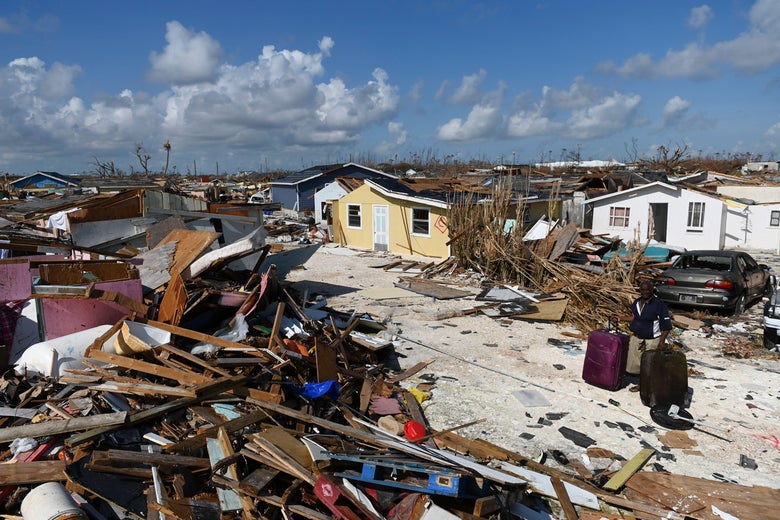
A woman collects her belongings before going to the port to evacuate in Marsh Harbour, Bahamas, one week after Hurricane Dorian.
ANDREW CABALLERO-REYNOLDS/Getty Images
In a little-noticed case with major implications, a United Nations panel ruled in January that refugees fleeing a threat to their life or safety from climate change cannot be forced to return home by their adoptive countries. The U.N. Human Rights Committee ruling demolished a long-standing practice of denying the legitimacy of climate refugees’ rights in international law.
In the case, the U.N.’s Human Rights Committee ruled against a Kiribati man claiming asylum in New Zealand, finding that the threat he faced was not imminent. But the panel made clear that a nation’s forced removal of migrants displaced by the climate crisis could violate their legally-protected right to life.
The decision has the potential to radically alter international refugee law, even as the climate crisis is on track to displace tens of millions of people over the coming decades. The bedrock U.N. treaty governing the rights of displaced people does not mention the environment, climate or disasters, narrowly defining refugees as those with a well-founded fear of persecution because of their race, religion, nationality, political opinion or membership in another social group. When it came to climate change, refugee law created an ill-fitting framework for the 21st century, leaving millions ineligible for safe harbor— even when their safety and security were imminently at risk.
The recent U.N. panel’s decision flung open the door for climate refugees to attain legal victory in international fora, but the law still snuffs out hope at the domestic level. That needs to change. The panel’s decision will allow lawyers in international and domestic courts to use the case’s precedent-setting text and reasoning to argue for clients whose claims are based on conditions created by the climate crisis. The U.N. panel’s ruling does not bind countries, but it lights a way toward a more equitable future at an urgent moment.
Individual nations can, of course, choose to ignore non-binding international law. American law is tilting in that direction. U.S. asylum law protects only those who show a well-founded fear of persecution based on the narrowly drawn protected grounds outlined in the U.N. treaty. And the current administration has demonstrated a stony opposition to refugee rights.
The United States has contributed more than any other country to the climate crisis already roiling the globe. Meanwhile, the Trump administration has sought to dramatically curtail the number of migrants eligible for asylum or protection under federal law. The Trump administration plans to admit a maximum of just 18,000 refugees in fiscal year 2020 – a 40 percent decrease from 2019 and the lowest number of refugees admitted by an American administration in any single year since 1980, the year the nation’s refugee resettlement program was birthed.
Even emergency protections designed to mitigate the aftermath of natural disasters have been abandoned. The United States has historically granted Temporary Protected Status to people whose home countries are impacted by extraordinary natural disasters and other urgent situations, including to visitors from Honduras, Haiti and Nicaragua. The administration last year declined to grant Temporary Protected Status to Bahamanians to allow them to live and work in America after Hurricane Dorian thrashed the Bahamas, tenderizing the islands and leaving large portions of land virtually unlivable. The science suggests that Hurricane Dorian, which lashed the Bahamas last August, was intensified by climate change.
Trump’s radical restrictionist policies and the expansive U.N. panel’s approach represent twin poles of a choice facing all world leaders. Climate refugees are in the eye of a political hurricane. The two defining stories of the coming decade will be the global surge of authoritarian nationalism and the transnational impact of the climate crisis— both grisly and growing. These grim trends are on a collision course. As entire nations slip further underwater, become engulfed by fires and are razed by storms, displaced climate crisis survivors will become fodder for fledgling autocrats seeking political scapegoats.
The United Nations is an imperfect tool to foil this crisis. The body has been crippled by paralysis and is bogged down in bureaucratic rancor. There is evidence that Russia— one of five permanent members of the U.N. Security Council, alongside the United States— deliberately exacerbated Syrian refugee flows to sew discord and political upheaval in the West. Still, the U.N. is the only near-functioning global multilateral institution we’ve got. U.N. member states needs to draw, ratify and sign into domestic law a treaty granting formal refugee status to climate refugees or risk ceding fertile ground in the global campaign to preserve human rights and democracy. By beginning to calcify the rights of climate refugees under international human rights law, the U.N. panel’s recent decision applies some pressure to nations to come to the table to formally guarantee those rights.
Developed nations have a responsibility to shelter migrants harmed by centuries of carbon pollution. A compassionate policy is in our interest, too.
Readers like you make our work possible. Help us continue to provide the reporting, commentary and criticism you won’t find anywhere else.
Join Slate Plusfrom Slate Magazine https://ift.tt/39Qv5ia
via IFTTT
沒有留言:
張貼留言